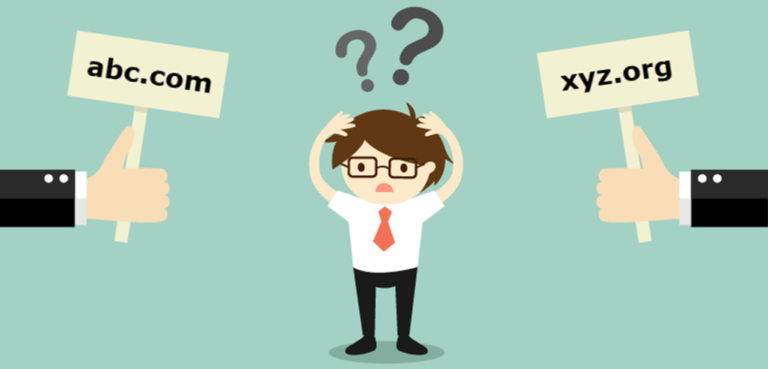What is the best sales reporting tool for your business? The short answer: it depends.
Modern business is dominated by data. It makes sense. Without a sufficient knowledge of statistics, KPIs, and other analytics, it’s difficult to make accurate decisions and improve company performance. This is especially true for sales teams.
If you don’t know where your best customers come from; the optimal times to reach them with a call, text, or email; and where the leaks are in your sales funnel, you’ll have a hard time reaching your sales quotas on a regular basis.
Fortunately, sales reporting software exists to get you the data you need! You just have to determine which tool fits your company best. This isn’t always easy to do…
There are A LOT of sales reporting tools on the market. Some are designed for enterprise companies, others for one-man selling operations. Plus, inside and outside sales teams have vastly different needs, as do the management professionals who oversee them.
Suffice to say, there are a lot of variables at play and it can be difficult to choose a solution that suits everyone’s needs and ensures company-wide adoption. To select the right reporting solution, you first need to know exactly what to look for.
In this article, we’ll explore what sales reporting software is, and the 13 questions you must ask in order to choose the right tool for your team.
Let’s dive in!
What is Sales Reporting Software?
Sales reporting software is exactly what it sounds like: a tool that helps sellers track (i.e. report on) their sales. When you’re able to see the data generated by your sales efforts, you can analyze the numbers and optimize your selling processes.
Sales reporting software helps teams:
- Organize data and monitor key metrics
- Present relevant data to key stakeholders – reps, managers and executives
- Identify bottlenecks across the entire sales pipeline
- Measure how specific sales activities are moving sales targets
- Hit sales quotas more consistently
- Oversee team goals and individual contributions
- Deliver more accurate sales forecasting
While a sales reporting tool will undoubtedly benefit your organization, choosing the right platform for your company’s unique needs is tricky. To make the right decision, salespeople need to ask the right questions.
How to Choose the Best Sales Reporting Software (13 Questions to Ask)
This is actually the wrong question. Instead, ask yourself, “What’s the best sales report software for my company?” What works well for sellers at Company ABC might not work as well for your team, and vice versa.
Fortunately, by asking yourself the following 13 questions, you’ll be able to better determine which sales reporting tool is the right fit for your organization.
1. Is it For Inside or Outside Sales Reporting?
The first question you need to ask yourself when choosing a sales reporting tool is who is the specific application designed for?
Inside and outside sales teams need different levels of insight to meet their sales quotas. Which kind of team are you a part of? If you’re involved in field sales, you’ll likely want to track activities and performance at the territory level.
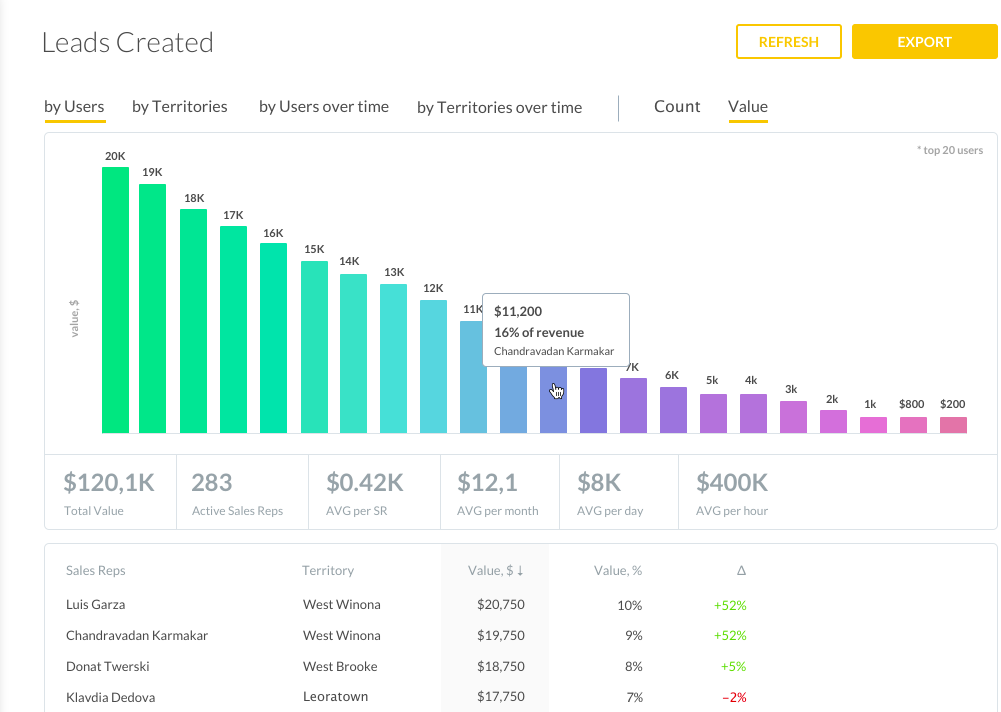
Image: SPOTIO allows field sales managers to report on activity and performance metrics at the rep, territory and team levels.
By answering this question first, you’ll eliminate a lot of poor-fit solutions from your list almost immediately.
Your company can use a tool like SPOTIO to integrate field sales and reporting capabilities into your existing CRM. This will allow you to get the data you need, while still using the tools you already know and enjoy using.
2. What Type of Sales Data do You Need to Report On?
Next up, ask yourself what kind of sales data you need to report on. Not all solutions will give you access to the same data points, so knowing what you need is paramount.
Field teams generally need to analyze and break down revenue numbers by territory. But does your team also need access to rep and team-level activity insights? What about management? Do they need a specific kind of report to properly evaluate performance and measure progress against sales targets?
Make a list of all the data points you need a sales reporting software to generate and keep the document handy as you vet various solutions.
3. Are You Able to Track Multi-Channel Sales Activity?
In the old days, there were very few ways to reach a prospect directly with your sales message.
You could visit them face to face, call them on the phone, or send them direct mail. Today, there are dozens of communication channels available to you.
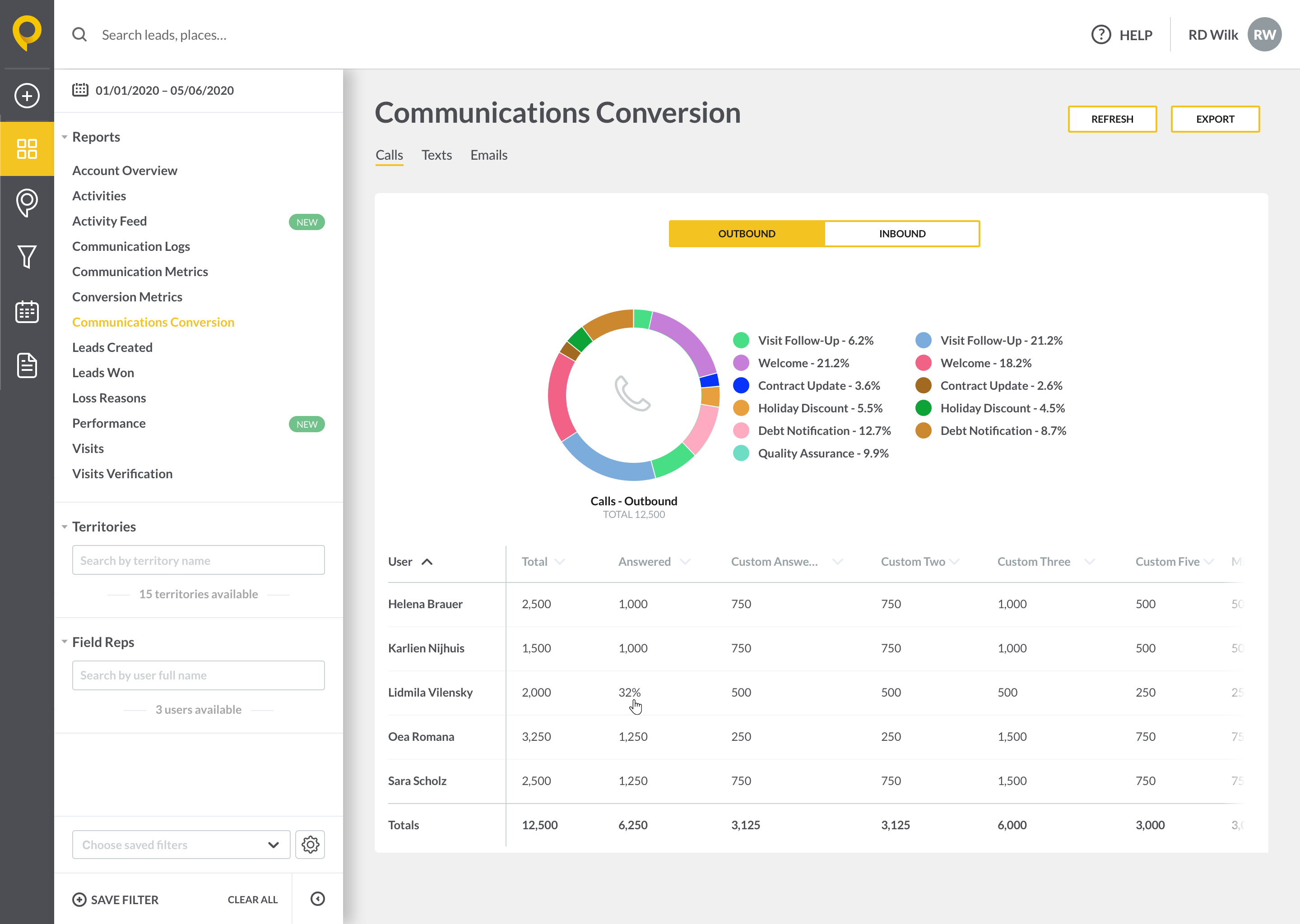
Image: SPOTIO enables sales team to automatically track every visit, call, text and email.
The sales reporting software you choose should be able to track all of the channels you use — both online and off.
Before settling on a specific solution, make sure the tool will allow you to easily capture and input data. If it doesn’t, the reports you generate won’t be accurate and your sales processes will suffer as a result.
4. Is it Easy to Build Reports?
Speaking of reports, does the tool you’re considering make it easy to create them? You should be able to segment and visualize your data in different ways. That way sales reps, managers, and executives can each get an accurate view of daily activities and the ways in which they affect both the sales pipeline and company revenue.
SPOTIO’s My Reports feature enables its users to create custom reports with an intuitive drag-and-drop builder:

5. What Level of Customization is Available?
Every company is different and your sales team has a specific way of doing things. If the sales reporting tool you choose doesn’t allow for customized reports, you’ll have a hard time visualizing the data in a meaningful way for stakeholders.
Choose a sales tracking tool that’s malleable to your team’s needs — both in regards to the data points it lets you track and the ways in which it enables you to visualize said data.
Just don’t get too carried away with this idea and choose a solution with every possible bell and whistle. Customization is great, but so is simplicity. Try to find a tool that’s both flexible and doesn’t require a degree in rocket science to operate correctly.
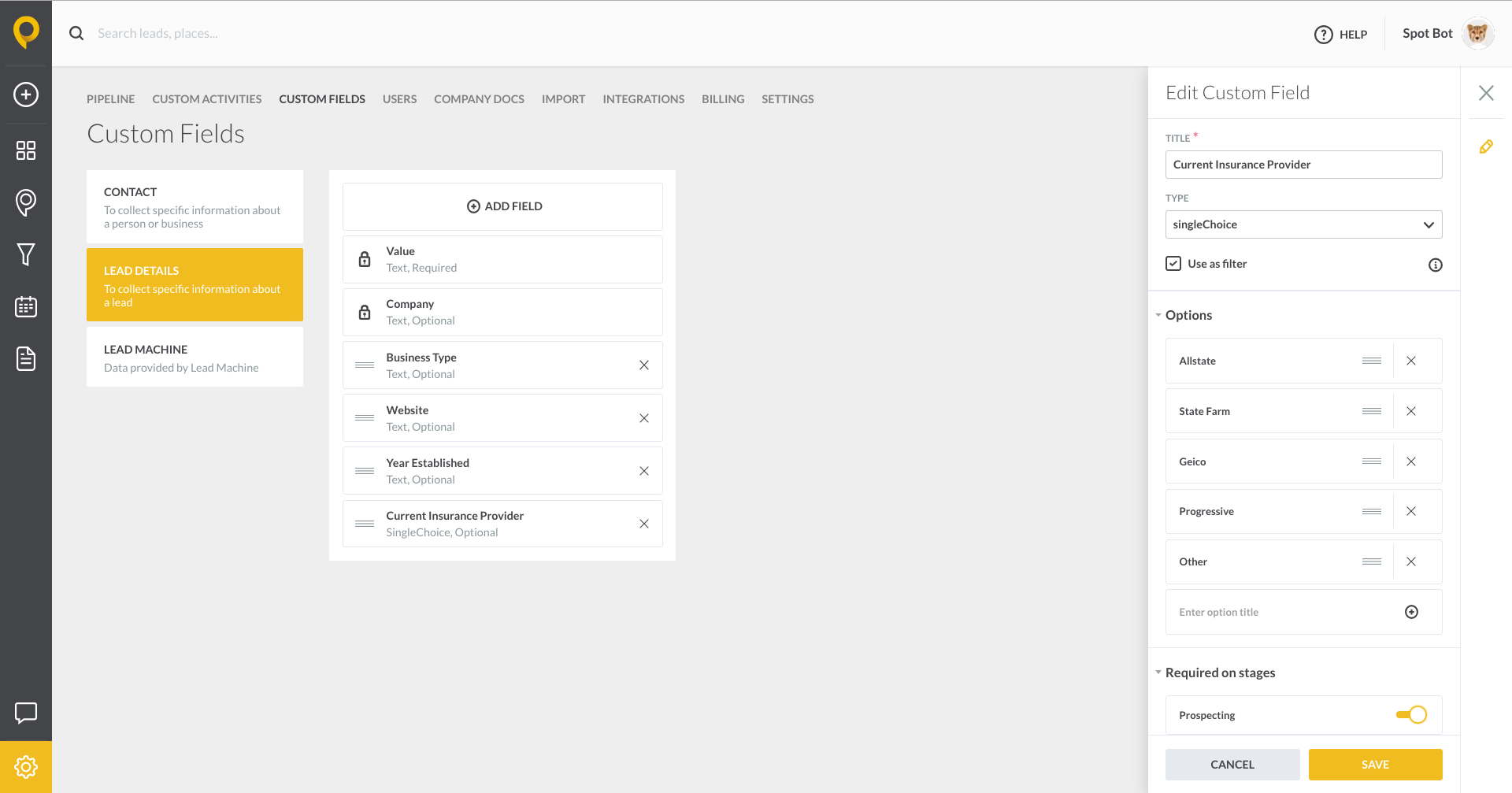
For example, SPOTIO gives users access to Custom Statuses, which will allow you to incorporate unique sales processes into the tool. Simply determine what you want to track, then let SPOTIO automatically fill in these details while you prospect.
6. Does it Provide Activity-Level Reporting?
Annual goals are achieved through daily actions. If your sales reporting tool of choice doesn’t allow you to track daily activity, you might not realize you have a faulty process until it’s too late.
Make sure the reporting solution you use shows how daily efforts translate into leads, prospects, and customers on a weekly and monthly basis — or not. That way you can take this information and either adjust your selling approach or double down on winning tactics.
For example, you’ll likely want to track the number of emails sent, calls made, social media conversations generated, booked meetings, etc.
7. Can it be Used in the Field?
If you’re part of an outside sales team, you’ll definitely want to choose a sales reporting tool that can be used in the field, i.e. can be accessed via an app on a mobile device.
Think about it: you could jot down information about the prospects you meet in the field on a yellow legal pad or in some kind of journal, then transfer those details to your tracking software once you make it back to the office. But is this really the best use of your time?
Instead, eliminate tedious data entry work and boost productivity by selecting a solution that you can easily take on the go with you.
8. Does it Provide Automated Notifications?
Speed is important in sales. The faster you can close deals, the less time it will give your prospects to get cold feet and your competition to swoop in and steal the sale.
That’s why we recommend choosing a sales report software that features automated email notifications, which can be triggered by specific events. Wouldn’t it be nice to know, for example, when a prospect downloads a white paper from your website? You can easily use this information to gauge prospect interest and move them farther down your pipeline.
Your reporting tool should give you access to key data points and enable you to act on them quicker than ever before.
9. Does it Integrate With Other Data Sources?
Here’s the thing: just about every business uses multiple pieces of software to run operations. Why? Because no application does everything a modern company needs it to. This fact makes integration capabilities a real concern.
Investigate whether or not your current technology stack will connect with the sales reporting tools you’re considering — and whether the integration is seamless or not.
10. How is Data Secured?
Data security is always a top concern. Many big-name brands have gotten themselves into hot water by not protecting their customers’ private details. Don’t be like these companies! Find a sales reporting tool that’s committed to data security.
While this isn’t the most exciting feature to look for, it’s incredibly important and will ensure the safety of your customer and business data.
11. How Does Pricing Scale?
Budget is an ever-present concern for most businesses. You need to make sure that you can afford the sales reporting tool you’re interested in. But you also need to check to see how pricing scales for the solution, too.
The last thing you want to do is onboard a new reporting solution, only to realize that prices skyrocket as your team and/or sales activity increases. Take the time to understand how pricing will change as your team and operations scale.
Cost is often the deciding factor between similar solutions and can make choosing between two options much easier.
12. Have You Checked Customer Reviews?
At this point, you’ve probably narrowed down your search to just a few sales report software options. Now you need to look at what past and current users say about these tools.
This is so important! A certain solution might have every feature you need and be well within budget. But if a large portion of its user base claims the tool is difficult to use or buggy, you should seriously consider investing in something different.
So read as many reviews as you can on sites like Capterra and G2. Better yet, speak with current users about their experiences if you’re able!
13. What Level of Customer Support is Provided?
Finally, take customer support into account when deciding which sales reporting tool to use for your company. A rude help team will be unpleasant to work with.
How do you tell which solutions offer quality support? You should be able to get a good idea by reading product reviews, your interactions with the tool’s sales team, and the quality of help you receive during a free trial.
Top Sales Reporting Tools
Keeping track of your sales with accurate reports can be easy with the right tools.
SPOTIO
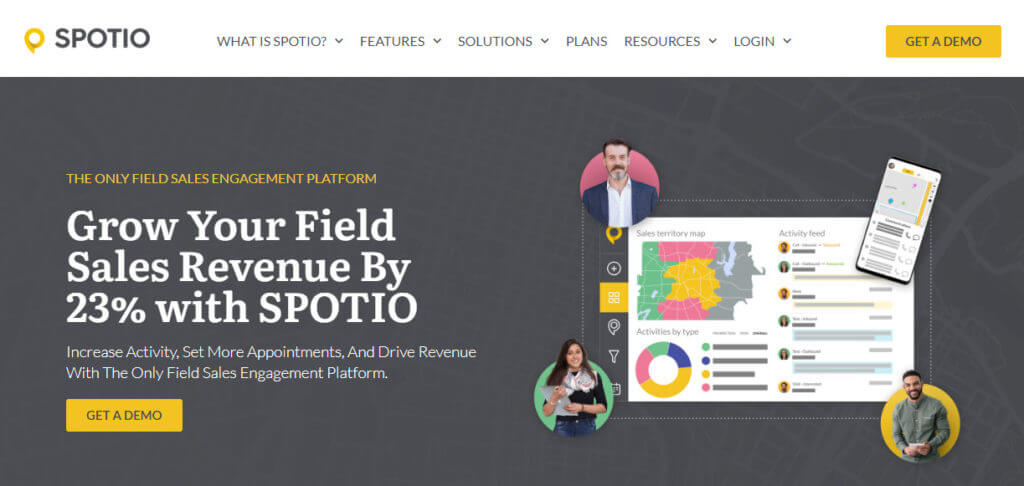
Best for: Outside sales teams
With SPOTIO’s Sales Tracking Software, sales performance is more predictable with the tool’s easy-to-read insights and analytics. With detailed reports, you’re better equipped to make strategic decisions and hit your goals.
When your team is in the field, you need to know how your reps are doing and where gaps might be to mitigate any issues. SPOTIO enables managers to track rep location, sales activities, revenue data, and pipeline metrics at the rep and territory levels.
Key features:
- Sales activity reporting across multiple channels
- Sales performance reporting at the rep, territory and organization levels
- Custom pipeline visibility reports
- Sales win-loss analysis
- Drag-and-drop custom report builder
- Daily and weekly updates
- Create sales leaderboards and incentivize performance
- GPS rep location tracking
- Automatically sync field data with your CRM
- Mobile app that enables activities and notes to be added from the field
Salesforce CRM
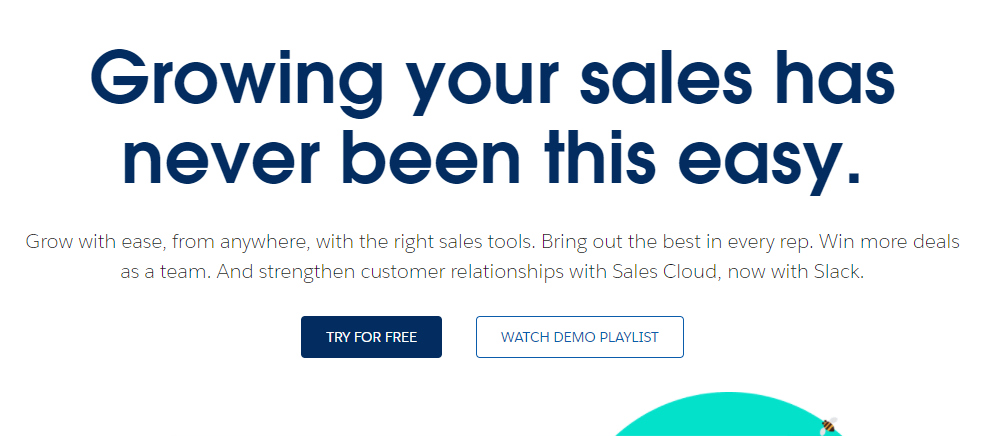
Salesforce provides CRM reporting tools for sales leaders to quickly access the data they need to make critical business decisions. Salesforce places large amounts of information at your fingertips, that is not only easily accessible, but analyzed. The reports that Salesforce offers provide valuable insights into profitability, customer needs, pipeline efficiency, goal progression, and more.
Key features:
- Pipeline visibility and reporting
- Interactive dashboards
- Customizable sales forecasting reports
- Native integration with SPOTIO
Pipedrive CRM
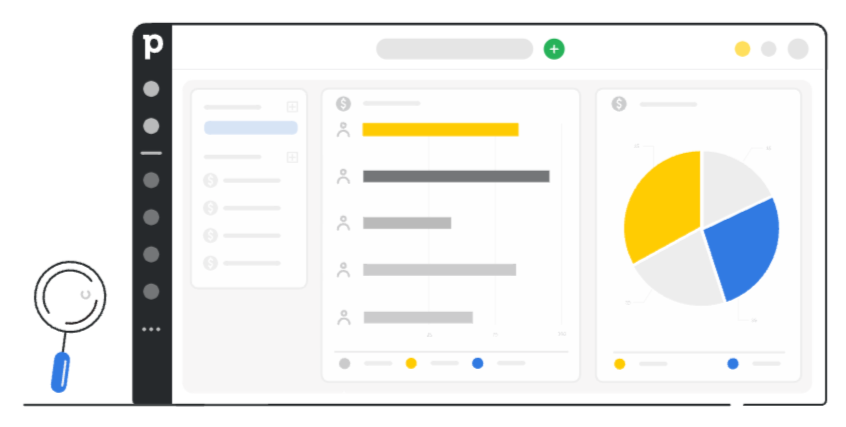
Pipedrive helps make sales operations around activity-based selling more efficient. The tools help you effectively manage leads and deals around the clock with custom chatbots and web forms. Communications are tracked, letting you see calls, emails, and contact history. Furthermore, you can reduce repetitive tasks by letting AI automate your administrative tasks so you can focus on larger goals.
Key features:
- Custom report builder
- Lead reporting and deal tracking
- Revenue forecast reporting
- SPOTIO integration
Which Sales Reporting Tool is Right for Your Business?
Choosing a sales reporting tool doesn’t need to be overwhelming. While certain tools are best suited for inside sales teams, SPOTIO is the best sales reporting tool for outside sales managers.
Here are a few of SPOTIO’s top reporting features:
- Track sales activities at the rep, team and organizational levels.
- View pipeline activity inside sales territories.
- Create custom metrics and build KPI dashboards.
- Create rep accountability with GPS location tracking.
- Motivate reps with team leaderboards.
- Build pipeline benchmarks and accurate sales forecasts.
- Create custom reports with our drag-and-drop builder.
If you think SPOTIO might be a good fit for your company, request a demo today. Our knowledgeable team will walk you through our solution’s features and help you determine if SPOTIO is the right sales reporting software for your company.

